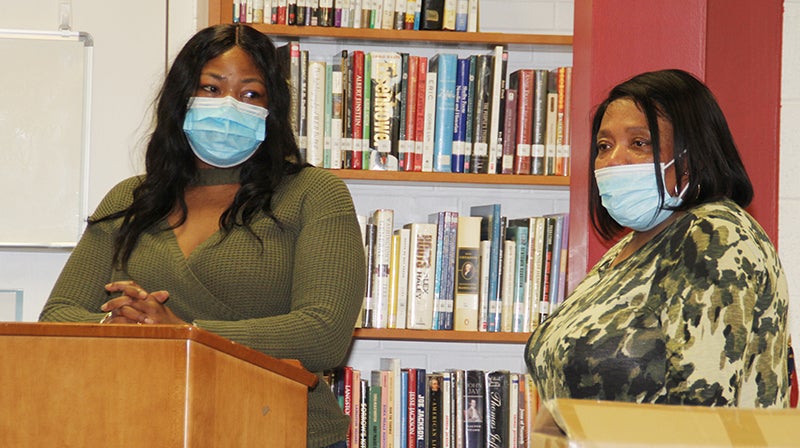Library vote derailed
Published 11:03 am Wednesday, February 8, 2012
GATESVILLE – Citizens of Gates County will not be able to cast a vote to either support or oppose the building of a new public library.
That’s the legal opinion of Gatesville attorney Phillip “Pitt” Godwin Jr. based on his research of North Carolina General Statutes and consultation with lawyers at the state’s Institute of Government. Godwin serves as legal counsel for Gates County local government, to include the board of commissioners.
Godwin’s research into the matter was sparked by a petition presented to the commissioners at their Jan. 4 meeting. There, Gilbert Cherry of Eure handed commission chairman Graham Twine with copies of a petition bearing over 600 signatures that calls for local government officials to conduct a voter referendum on whether or not the county needs to proceed with building the much-debated library.
Cherry launched his petition drive in early October of last year. The document, which circulated throughout the county, reads as follows:
“We the concerned citizens of Gates County, North Carolina petition against the needless spending of taxpayer money on a new library. The citizens are not against improving the library system in the county. However, we the taxpayers of Gates County are against the reckless spending of taxpayer money when the citizens do not have any input and without allowing the citizens to decide the amount and/or the financing mechanism.”
At the Jan. 4 meeting, Cherry stated, “We’re asking that the county citizens be entitled to a vote on this library and the money spent on it.”
Twine, in a telephone interview conducted with this newspaper on Feb. 5, confirmed that he asked Godwin to research the state statutes based on the petition.
“We needed a legal opinion on the validity of conducting a voter referendum in regards to building a public library,” Twine said. “What Pitt found in his research is there is no legal way to hold a referendum on this particular matter.
“We hope the public will understand there is no legal way to do it,” Twine continued. “We are required to hold to the intent of the law.”
Twine also acknowledged that the library will be built using taxpayer dollars, as has been stated numerous times during the course of this more than year-long discussion.
“Yes, we are using tax money to build the library; just like we use tax money to buy office supplies. We’re not required to hold a voter referendum every time we have to go out and purchase paper clips,” Twine noted.
Godwin’s findings were presented in writing to the commissioners. The Gates County Index obtained a copy of the letter, dated Jan. 31, that Godwin sent to the board.
“Generally, a unit of government in North Carolina may only call a referendum if there is a statute that specifically authorizes such,” Godwin wrote. “I can find no statute that authorizes a county to call a referendum on the question of whether to build a library. Therefore, it is my opinion, after conferring with attorneys of the Institute of Government, that the question of whether Gates County should build a library can not be put to a referendum.”
He continued, “This general rule charges you, as commissioners, with the responsibility of making such decisions whether to borrow funds and build a new library. As far back as 1954, our state case law has held that, ‘There is no inherent power in any government body to hold an election, i.e. referendum, for any purpose with out affirmative constitutional or statutory authority’.”
In directly addressing the petition, Godwin stated, “The proposed referendum and petition presented to you {cites} N.C.G.S. 153A-149(d), which does allow the County to levy property taxes for any purpose for which the County is authorized by law to appropriate money.”
“In essence, you as commissioners could calculate how much money would be needed to build the library by way of a specific tax levy to fund the building of a library and put the question to the voters to levy the tax or not,” Godwin wrote. “However, if the voters said yes to a levy, the Commissioners would not be obligated to levy a special library tax, but you, as commissioners, would only be authorized to do so. If the voters said no to a special library tax, you, as commissioners, could still use regular funds available or borrowed to build the library and pay off the loan as you have already voted.”
Godwin added that after careful consideration, “I do not recommend a referendum as this course of action because the general rule is that you, as commissioners, are charged with the responsibility of making decisions whether to borrow the money and build the library and in fact, you have already voted and approved to make the loan and voted and approved how to repay the same.
“Without repeating myself, but to be clear, my conversations with the Institute of Government’s attorneys, my research and information that I can gather leaves me to express a legal opinion that there is no specific authorization for a voter referendum and that it lies with the discretion of you, our elected commissioners, to make decisions of this nature and duly vote upon the same, which you have done,” Godwin’s letter concluded.
At their Nov. 2 meeting, the commissioners voted unanimously to borrow $1.5 million from BB&T Bank to fund the project and pay back that loan within five years.
It was during their September meeting where the commissioners, in a 3-2 vote, decided to cap the construction price at $1.5 million.



